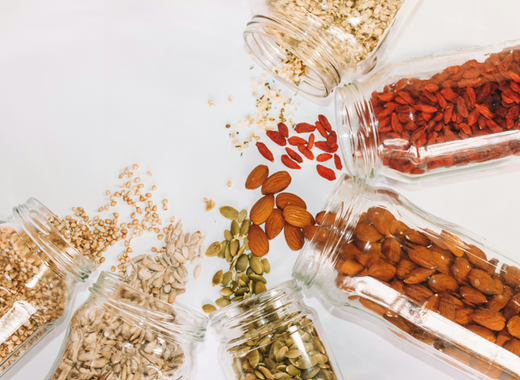Hair health is closely connected to the nutrients you provide your body, and zinc is one of the most critical minerals for maintaining strong, vibrant hair. From supporting the structure of hair strands and promoting scalp health to ensuring the proper functioning of hair follicles, zinc clearly plays a crucial role.
What is Zinc?
Zinc is an essential trace mineral required in small amounts however, it is used in over 300 enzymatic reactions in the body. It is found in all body tissues with 85% found in muscle and bone, 11% in the skin and the liver and the remaining in all the other tissues. Some important metabolic functions include cell growth and development, metabolism, cognitive, reproductive, and immune system function. While its roles are diverse, zinc’s contribution to hair health is particularly significant.
Since your body doesn’t store zinc, it must be consumed regularly through diet or supplements. Without sufficient zinc, vital processes such as tissue repair, hormone regulation, and antioxidant defense can be disrupted thus, affecting your hair, skin, and nails too.
The Role of Zinc in Hair Health?
Zinc plays a crucial role in hair health due to its involvement in cellular growth, repair, and the maintenance of the oil-secreting glands surrounding hair follicles. Here’s a closer look at its key contributions:
Keratin Production: Zinc acts as a cofactor for enzymes involved in keratin synthesis, the protein responsible for hair strength and structure. Without enough zinc, hair can become brittle, weak, and prone to breakage.
Hair Growth Cycle Support: By facilitating cell division and protein synthesis, zinc fuels the anagen (growth) phase of the hair cycle. Adequate zinc ensures the development of strong, healthy hair strands.
Follicle Integrity: Zinc maintains the health and structural stability of hair follicles while regulating oil production, ensuring an optimal environment for growth.
Symptoms of Zinc Deficiency
Zinc deficiency affects around 17 percent of the world's population, most heavily impacting the developing world. A zinc deficiency can manifest in various ways such as;
- Weakened Immunity: Increased susceptibility to colds and infections
- Skin Issues: Dryness, rashes, and delayed wound healing
- Decreased Appetite and/or Loss of Taste: Zinc is crucial for taste perception and appetite regulation
- Digestive issues: Diarrhoea and bloating may occur
Hair-specific symptoms of zinc deficiency can include:
- Excessive hair shedding
- Hair that is brittle, dull, or dry strands prone to breakage
- Scalp issues like dandruff (seborrheic dermatitis) and itchiness
- Premature hair greying
If you're unsure whether your diet provides adequate zinc, consider seeking advice from your doctor or a qualified nutritionist for personalised guidance.
Food Sources of Zinc
If you’re aiming to increase your zinc intake, consider incorporating these zinc-rich foods into your meals:
- Shellfish (Oysters being particularly rich)
- Meat; Beef liver (best absorption of zinc is usually from animal sources)
- Dairy products (i.e. milk and cheese)
- A handful of pumpkin seeds per day
- Cashews and pine nuts
- Lentils
What the Research Tells Us About Zinc and Hair
Zinc’s role in hair health has been the focus of extensive research, particularly its effect on hair follicles—the structures responsible for producing healthy hair strands.
A 2013 study by Kil, Min Seong et al. highlights zinc as a key factor in maintaining hair health. The researchers discovered that individuals experiencing hair loss had significantly lower serum zinc levels compared to a control group with no hair loss. This finding suggests a strong connection between zinc deficiency and hair loss.
The study also found that severe zinc deficiency was especially common in individuals with alopecia areata (a condition causing patchy hair loss) and telogen effluvium (temporary shedding often triggered by stress or illness). These results suggest that disruptions in zinc metabolism may play a significant role in certain types of hair loss.
Final thoughts
Although we've explored how zinc can support hair growth, it's important to recognise that supplements and nutrition are highly individual. Incorporating zinc-rich foods like animal products, pumpkin seeds, and lentils into your diet can help sustain healthy levels. For those experiencing hair loss or struggling with zinc deficiency, supplementation may provide additional benefits.
If you’re dealing with thinning hair or excessive shedding, boosting your zinc intake through diet or supplements could have a meaningful impact. Consult a healthcare professional to determine the best approach to support your hair health.
References
- National Institutes of Health, Office of Dietary Supplements. (n.d.). Zinc: Fact sheet for health professionals. Retrieved January 14, 2025, from https://ods.od.nih.gov/factsheets/Zinc-HealthProfessional/
- Tapiero, H., & Tew, K. D. (2003). Trace elements in human physiology and pathology: Zinc and metallothioneins. Biomedicine & Pharmacotherapy, 57(9), 399–411. https://doi.org/10.1016/s0753-3322(03)00081-7
-
Belay, A., Gashu, D., Joy, E. J. M., et al. (2021). Zinc deficiency is highly prevalent and spatially dependent over short distances in Ethiopia. Scientific Reports, 11, 6510. https://doi.org/10.1038/s41598-021-85977-x
-
Park, H., Kim, C. W., Kim, S. S., & Park, C. W. (2009). The therapeutic effect and the changed serum zinc level after zinc supplementation in alopecia areata patients who had a low serum zinc level. Annals of Dermatology, 21(2), 142–146. https://doi.org/10.5021/ad.2009.21.2.142
- Kil, M. S., Kim, C. W., & Kim, S. S. (2013). Analysis of serum zinc and copper concentrations in hair loss. Annals of Dermatology, 25(4), 405–409. https://doi.org/10.5021/ad.2013.25.4.405
-
Ogawa, Y., Kinoshita, M., Shimada, S., & Kawamura, T. (2018). Zinc in keratinocytes and Langerhans cells: Relevance to the epidermal homeostasis. Journal of Immunology Research, 2018, 1–11. https://doi.org/10.1155/2018/5404093
- Lalosevic, J., Gajic-Veljic, M., Lalosevic Misovic, J., & Nikolic, M. (2023). Serum zinc concentration in patients with alopecia areata. Acta Dermato-Venereologica, 103, adv13358. https://doi.org/10.2340/actadv.v103.13358







